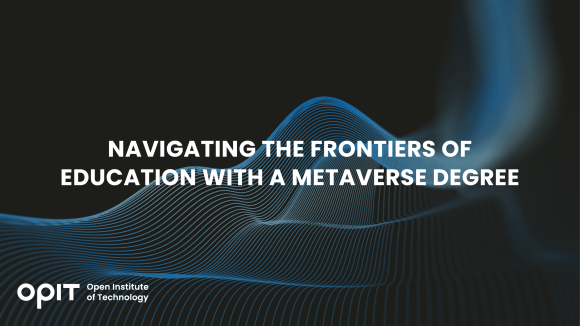

Interest in the potential of the metaverse is skyrocketing. This virtual landscape shows promising innovations in the way an average user interacts with tech. Using a blend of augmented reality (AR), virtual reality (VR), and blockchain technology, it promises to elevate user experience to new heights.
But it’s not just techies that are rejoicing. The metaverse will bring new marketing, brand-building, and sales opportunities for businesses of all sizes. And even more exciting – it promises to supercharge one of the globe’s fastest-growing entertainment sectors, gaming.
Those wanting to get in on the ground floor of the rapidly growing business and employment opportunities of the metaverse should carefully evaluate the advantages of a metaverse degree.
The metaverse is attracting some large investments from technology leaders, including Apple, Google, and Meta (previously known as Facebook). Even Microsoft has staked a claim to the immersive digital universes promised by Meta’s Metaverse.
With this much investment, it seems certain that the metaverse is here to stay.
The metaverse provides a new generation of business leaders and innovators a unique opportunity in this fast-evolving space. For these aspirant leaders, leveraging the opportunities of the metaverse will require a multidisciplinary degree. Those equipped with this specialized education will be in a prime position to enter the rapidly evolving metaverse-related employment market and adapt to the digital landscape’s changes.
Best On- and Off-Line Metaverse Degrees
Citibank estimates that the pool of metaverse users could top 5 billion by 2030 and that by then, metaverse business may be worth around $13 trillion.
The potentially explosive growth of metaverse career opportunities means that choosing the right provider of on or offline degree courses is essential. Given increasing demand, it is no surprise that some of the most respected technology-focused higher education institutions are providing some cutting-edge options for advanced study. These institutions embrace a multidisciplinary approach to the intersection of technology, business, and creativity.
Here are the five best metaverse degrees currently available:
Carnegie Mellon University – The Master of Human-Computer Interaction (MHCI) Program
This three-semester program consists of core courses such as the Capstone course – a seven-month R&D team project with an external industry client. The offering from Carnegie-Mellon claims to be the first program dedicated to preparing innovators and professionals for a career in human-computer interaction, user experience design, and user-focused research.
The University of Washington – MSc in Human-Centered Design and Engineering (HCDE)
The University of Washington MSC is a flexible course that offers a part-time or full-time degree. The program’s core courses include Theoretical Foundations of Human-Centered Design & Engineering, Navigating Design in Organizational Contexts, Visual Communication, and User-Centered Design.
University of Queensland – Master of Interaction Design
The University of Queensland’s course takes two years to complete, one of the lengthiest on this list. It incorporates core courses such as Design Thinking, Digital Prototyping, Human-Computer Interaction, and Social and Mobile Computing. Rather than focusing on the technology that will power the metaverse, this master’s degree focuses on how users interact with virtual environments. Those who qualify will become Interaction Designers, creating user-friendly and accessible digital products.
UCL (London, England) – The Human-Computer Interaction MSc
The UCL 12-month degree program is focused on sharpening their students’ real-world skills, with courses such as Interaction Design, Interaction Science, and the MSc HCI Project. This interdisciplinary MSc is centered on practical and professional skills related to the design and use of computer and mobile technology, with a concentration on interface usability.
University of Southern California (USC) – Master of Fine Arts in Interactive Media
As the lengthiest program on this list at three years, the USC degree features core courses such as Experiments in Interactivity, Design for Interactive Media Units, Survey of Interactive Media, Experiments in Interactivity, and Interactive Design and Production. The master’s program at USC prepares students for careers in the fast-growing field of interactive entertainment. It is suitable for those who do not have advanced computer capabilities and are unfamiliar with computer-based scripting. However, knowledge of computer-based authoring and production techniques will be useful.
OPIT’s Revolutionary Approach to Metaverse Education
Future-proof your qualification with an online Bachelor of Science (BSc) in Modern Computer Science from the Open Institute of Technology (OPIT). OPIT’s metaverse degree is the key to understanding and leveraging the latest developments in the field of interactive technology.
The elective choices offered by OPIT also allow students to master various metaverse-related competencies and tailor their degrees to suit their anticipated career path. Here are two examples of popular classes students are taking right now:
Specialization in Leadership and Business Development for the Metaverse
For those professionals who want to play a pivotal role in leading the metaverse revolution, this elective is a must. It examines how the metaverse is poised to disrupt existing business models through innovative digital asset management in a virtual environment. The course also examines the commercial applications of metaverse technology and how the metaverse leaders of tomorrow will use practical skills with real-world applicability to usher in a new wave of immersive opportunities.
Diving Into Project Methodology and Visual Communication
Electives such as “Project Methodology and Visual Communication” will equip the aspirant metaverse professional with the project management skills to master the virtual worlds of gaming and Meta’s Metaverse itself. Students will master topics such as agile project management, effective visual storytelling in virtual realities, and UI/UX design principles for immersive environments.
Why Choose OPIT for Your Metaverse Education?
Only those educational institutions that grasp the revolutionary nature of the metaverse can equip professionals with the skills and qualifications they require to become Masters of the Metaverse.
OPIT is fully accredited under the European Qualification Framework and the MFHEA (Malta Further and Higher Education Authority). It’s committed to providing the metaverse leadership of tomorrow with the skills they need to dominate the metaverse market.
Many institutions of higher learning offer foundational courses that will equip professionals with the skills required for a metaverse-focused career. OPIT is different because it provides students with real-world skills that can be leveraged from the day they obtain their degree. The theoretical underpinnings of these skills are delivered by recognized industry experts and innovators, providing students with insights that make a real difference in their chosen careers.
Dive Into the Metaverse With the Right Degree
The metaverse may be made of pixels, but it is real – and it’s here. The rise of the metaverse, a fast-evolving platform at the intersection of the digital and physical world, is set to entwine every aspect of our offline identity with a digital existence. But to enter this exciting field, you need the right degree.
A metaverse degree providing practical, real-world skills is required to dominate this ever-evolving digital space. An affordable, fast-track degree from OPIT will provide you with a comprehensive foundation of skills, theoretical and applicative, and marketable, to place you exactly where you need to be – at the forefront of this exhilarating frontier. Get ready to harness the potential of virtual realms with a metaverse degree from OPIT.
Related posts

Source:
- Agenda Digitale, published on November 25th, 2025
In recent years, the word ” sustainability ” has become a firm fixture in the corporate lexicon. However, simply “doing no harm” is no longer enough: the climate crisis , social inequalities , and the erosion of natural resources require a change of pace. This is where the net-positive paradigm comes in , a model that isn’t content to simply reduce negative impacts, but aims to generate more social and environmental value than is consumed.
This isn’t about philanthropy, nor is it about reputational makeovers: net-positive is a strategic approach that intertwines economics, technology, and corporate culture. Within this framework, digitalization becomes an essential lever, capable of enabling regenerative models through circular platforms and exponential technologies.
Blockchain, AI, and IoT: The Technological Triad of Regeneration
Blockchain, Artificial Intelligence, and the Internet of Things represent the technological triad that makes this paradigm shift possible. Each addresses a critical point in regeneration.
Blockchain guarantees the traceability of material flows and product life cycles, allowing a regenerated dress or a bottle collected at sea to tell their story in a transparent and verifiable way.
Artificial Intelligence optimizes recovery and redistribution chains, predicting supply and demand, reducing waste and improving the efficiency of circular processes .
Finally, IoT enables real-time monitoring, from sensors installed at recycling plants to sharing mobility platforms, returning granular data for quick, informed decisions.
These integrated technologies allow us to move beyond linear vision and enable systems in which value is continuously regenerated.
New business models: from product-as-a-service to incentive tokens
Digital regeneration is n’t limited to the technological dimension; it’s redefining business models. More and more companies are adopting product-as-a-service approaches , transforming goods into services: from technical clothing rentals to pay-per-use for industrial machinery. This approach reduces resource consumption and encourages modular design, designed for reuse.
At the same time, circular marketplaces create ecosystems where materials, components, and products find new life. No longer waste, but input for other production processes. The logic of scarcity is overturned in an economy of regenerated abundance.
To complete the picture, incentive tokens — digital tools that reward virtuous behavior, from collecting plastic from the sea to reusing used clothing — activate global communities and catalyze private capital for regeneration.
Measuring Impact: Integrated Metrics for Net-Positiveness
One of the main obstacles to the widespread adoption of net-positive models is the difficulty of measuring their impact. Traditional profit-focused accounting systems are not enough. They need to be combined with integrated metrics that combine ESG and ROI, such as impact-weighted accounting or innovative indicators like lifetime carbon savings.
In this way, companies can validate the scalability of their models and attract investors who are increasingly attentive to financial returns that go hand in hand with social and environmental returns.
Case studies: RePlanet Energy, RIFO, and Ogyre
Concrete examples demonstrate how the combination of circular platforms and exponential technologies can generate real value. RePlanet Energy has defined its Massive Transformative Purpose as “Enabling Regeneration” and is now providing sustainable energy to Nigerian schools and hospitals, thanks in part to transparent blockchain-based supply chains and the active contribution of employees. RIFO, a Tuscan circular fashion brand, regenerates textile waste into new clothing, supporting local artisans and promoting workplace inclusion, with transparency in the production process as a distinctive feature and driver of loyalty. Ogyre incentivizes fishermen to collect plastic during their fishing trips; the recovered material is digitally tracked and transformed into new products, while the global community participates through tokens and environmental compensation programs.
These cases demonstrate how regeneration and profitability are not contradictory, but can actually feed off each other, strengthening the competitiveness of businesses.
From Net Zero to Net Positive: The Role of Massive Transformative Purpose
The crucial point lies in the distinction between sustainability and regeneration. The former aims for net zero, that is, reducing the impact until it is completely neutralized. The latter goes further, aiming for a net positive, capable of giving back more than it consumes.
This shift in perspective requires a strong Massive Transformative Purpose: an inspiring and shared goal that guides strategic choices, preventing technology from becoming a sterile end. Without this level of intentionality, even the most advanced tools risk turning into gadgets with no impact.
Regenerating business also means regenerating skills to train a new generation of professionals capable not only of using technologies but also of directing them towards regenerative business models. From this perspective, training becomes the first step in a transformation that is simultaneously cultural, economic, and social.
The Regenerative Future: Technology, Skills, and Shared Value
Digital regeneration is not an abstract concept, but a concrete practice already being tested by companies in Europe and around the world. It’s an opportunity for businesses to redefine their role, moving from mere economic operators to drivers of net-positive value for society and the environment.
The combination of blockchain, AI, and IoT with circular product-as-a-service models, marketplaces, and incentive tokens can enable scalable and sustainable regenerative ecosystems. The future of business isn’t just measured in terms of margins, but in the ability to leave the world better than we found it.

Source:
- Raconteur, published on November 06th, 2025
Many firms have conducted successful Artificial Intelligence (AI) pilot projects, but scaling them across departments and workflows remains a challenge. Inference costs, data silos, talent gaps and poor alignment with business strategy are just some of the issues that leave organisations trapped in pilot purgatory. This inability to scale successful experiments means AI’s potential for improving enterprise efficiency, decision-making and innovation isn’t fully realised. So what’s the solution?
Although it’s not a magic bullet, an AI operating model is really the foundation for scaling pilot projects up to enterprise-wide deployments. Essentially it’s a structured framework that defines how the organisation develops, deploys and governs AI. By bringing together infrastructure, data, people, and governance in a flexible and secure way, it ensures that AI delivers value at scale while remaining ethical and compliant.
“A successful AI proof-of-concept is like building a single race car that can go fast,” says Professor Yu Xiong, chair of business analytics at the UK-based Surrey Business School. “An efficient AI technology operations model, however, is the entire system – the processes, tools, and team structures – for continuously manufacturing, maintaining, and safely operating an entire fleet of cars.”
But while the importance of this framework is clear, how should enterprises establish and embed it?
“It begins with a clear strategy that defines objectives, desired outcomes, and measurable success criteria, such as model performance, bias detection, and regulatory compliance metrics,” says Professor Azadeh Haratiannezhadi, co-founder of generative AI company Taktify and professor of generative AI in cybersecurity at OPIT – the Open Institute of Technology.
Platforms, tools and MLOps pipelines that enable models to be deployed, monitored and scaled in a safe and efficient way are also essential in practical terms.
“Tools and infrastructure must also be selected with transparency, cost, and governance in mind,” says Efrain Ruh, continental chief technology officer for Europe at Digitate. “Crucially, organisations need to continuously monitor the evolving AI landscape and adapt their models to new capabilities and market offerings.”
An open approach
The most effective AI operating models are also founded on openness, interoperability and modularity. Open source platforms and tools provide greater control over data, deployment environments and costs, for example. These characteristics can help enterprises to avoid vendor lock-in, successfully align AI to business culture and values, and embed it safely into cross-department workflows.
“Modularity and platformisation…avoids building isolated ‘silos’ for each project,” explains professor Xiong. “Instead, it provides a shared, reusable ‘AI platform’ that integrates toolchains for data preparation, model training, deployment, monitoring, and retraining. This drastically improves efficiency and reduces the cost of redundant work.”
A strong data strategy is equally vital for ensuring high-quality performance and reducing bias. Ideally, the AI operating model should be cloud and LLM agnostic too.
“This allows organisations to coordinate and orchestrate AI agents from various sources, whether that’s internal or 3rd party,” says Babak Hodjat, global chief technology officer of AI at Cognizant. “The interoperability also means businesses can adopt an agile iterative process for AI projects that is guided by measuring efficiency, productivity, and quality gains, while guaranteeing trust and safety are built into all elements of design and implementation.”
A robust AI operating model should feature clear objectives for compliance, security and data privacy, as well as accountability structures. Richard Corbridge, chief information officer of Segro, advises organisations to: “Start small with well-scoped pilots that solve real pain points, then bake in repeatable patterns, data contracts, test harnesses, explainability checks and rollback plans, so learning can be scaled without multiplying risk. If you don’t codify how models are approved, deployed, monitored and retired, you won’t get past pilot purgatory.”
Of course, technology alone can’t drive successful AI adoption at scale: the right skills and culture are also essential for embedding AI across the enterprise.
“Multidisciplinary teams that combine technical expertise in AI, security, and governance with deep business knowledge create a foundation for sustainable adoption,” says Professor Haratiannezhadi. “Ongoing training ensures staff acquire advanced AI skills while understanding associated risks and responsibilities.”
Ultimately, an AI operating model is the playbook that enables an enterprise to use AI responsibly and effectively at scale. By drawing together governance, technological infrastructure, cultural change and open collaboration, it supports the shift from isolated experiments to the kind of sustainable AI capability that can drive competitive advantage.
In other words, it’s the foundation for turning ambition into reality, and finally escaping pilot purgatory for good.
Have questions?
Visit our FAQ page or get in touch with us!
Write us at +39 335 576 0263
Get in touch at hello@opit.com
Talk to one of our Study Advisors
We are international
We can speak in:


